There's usually adequate training, assistance setting up your firm, and you will not need to stress over doing any of your own marketing and advertising since you'll have the added advantage of a nationally acknowledged brand name - how to get license for insurance agent. You will likewise likely have a more trusted type of compensation such as an income and advantages, plus sales bonus offers depending upon how well you do.
Even if they are not the best priced or most ideal item, they are the company you represent, therefore the item you need to encourage your client to go with. So if your parent company stops offering a certain line of insurance, you won't be able to offer it either. You might likewise be obligated to press certain items you feel your customer doesn't require or desire.
Positives: Your main concern for your independent agency will be to develop your own book of service and do the best thing by your customers. You can make your own hours, your own rules, and market your agency how and when you want. You'll be able to specialize in any, and as numerous lines of service as you want.
Negatives: As an independent agent you will be a small company owner and entrepreneur. This could be viewed on a positive OR negative depending on the person. You will require capital to begin business (how to be an independent insurance agent). how to become insurance agent. You will not have a constant earnings as you start your sirius radio cancel company and start your book of organization from scratch, because you'll make money entirely based off of commission.

Get This Report about How Much Does A Property And Casualty Insurance Agent Make
You may likewise have difficulty obtaining agreements, or "consultations," with reliable and respectable insurance coverage providers in the starting a Managing Representative Group or "MGA" (company who assists you get carrier visits) can help you with this part of the process (how to become an insurance sales agent). Which type of company is ideal for you? If you're an established representative, Discover more here remark below and inform us why you chose to go the route you did when you opened your company!.
The majority of individuals separate insurance agents by the type of insurance coverage they focus on health insurance representative, automobile insurance coverage agent, life insurance representative, and so on. In the insurance coverage industry, however, there is another crucial way that insurance agents can be categorized: captive insurance coverage representatives http://juliusbrre692.lowescouponn.com/10-easy-facts-about-what-is-it-like-being-an-insurance-agent-shown vs. independent insurance coverage representatives. Whether you are a captive insurance agent or an independent insurance agent can have a profound result on your daily regimen, the sort of insurance you offer, and your earnings potential within the market.
In return for captive representatives concurring to sell only their policies, insurer usually provide their unique agents with a fair quantity of assistance, which can consist of setting them up with a workplace or other work area, and providing access to an administrative staff to process documentation. When consumers get in touch with an insurance business about acquiring a policy, they will generally refer them to a captive agent that works in their area.
Rather, independent insurance agents agreement with multiple insurance provider, selling specific lines of insurance protection from those companies on a non-exclusive basis. While independent agents do not have access to the assistance and recommendations that insurance coverage companies offer to their unique representatives, independent insurance representatives have the benefit of having the ability to use their clients policies from multiple insurance providers, offering them the capability to offer a broader selection of coverage alternatives.
The 7-Second Trick For How To Report A Bad Insurance Agent
The biggest distinction in between captive and independent insurance representatives remains in settlement. Normally, independent insurance agents take home a higher portion of the sales they make, sometimes earning commissions as much as 50% greater than their exclusive representative counterparts. That stated, independent insurance agents are also responsible for paying for all their own overhead, suggesting that much of their revenues is invested maintaining their independent organization operation.
While independent insurance coverage representatives have a theoretically greater revenues ceiling than captive representatives, the stability provided by working straight for an insurer implies that a captive insurance representative's earnings is most likely to be more steady and constant. To offset the expenses of running independently, many independent agents partner with other representatives to form firms, with each member agent adding to the cost of operations.